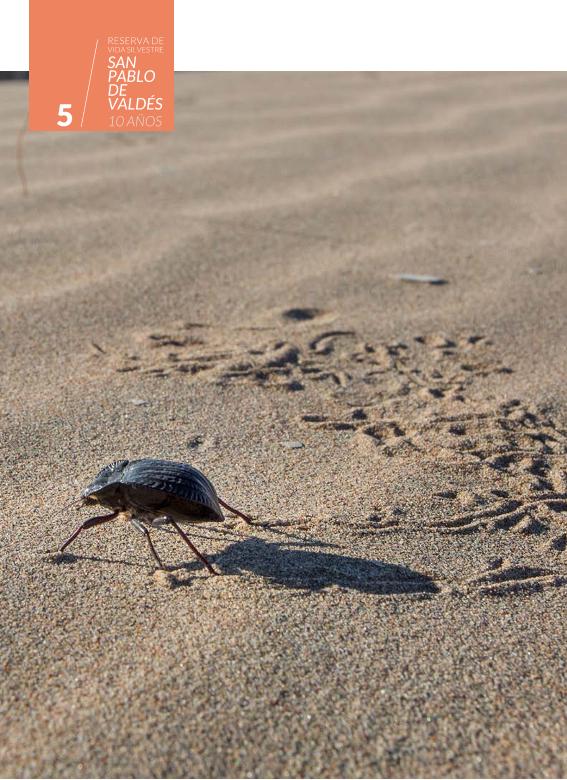Mostrar el registro sencillo del ítem
dc.contributor.author
Cheli, German Horacio

dc.contributor.author
Martínez, Fernando Joaquín

dc.contributor.other
Udrizar Sauthier, Daniel Edgardo

dc.contributor.other
Pazos, Gustavo Enrique

dc.contributor.other
Arias, Alejandro M.
dc.date.available
2020-05-27T20:44:18Z
dc.date.issued
2017
dc.identifier.citation
Cheli, German Horacio; Martínez, Fernando Joaquín; Artrópodos terrestres en la Reserva de Vida Silvestre San Pablo de Valdés, su rol como indicadores ambientales; Fundación Vida Silvestre Argentina; 2017; 98-117
dc.identifier.isbn
978-950-9427-31-0
dc.identifier.uri
http://hdl.handle.net/11336/106071
dc.description.abstract
Los artrópodos son esenciales para los ecosistemas áridos. Su principal amenaza es la pérdida de hábitat. Es valioso analizar su dinámica espacial en función de factores ambientales porque permiten predecir cambios en la biodiversidad. Así la Reserva de Vida Silvestre San Pablo de Valdés (RSPV) constituye un sitio único para estudiar cómo los artrópodos interactúan con la heterogeneidad ambiental natural y con el principal disturbio antrópico de la región, el pastoreo ovino. En este trabajo se describe la comunidad de artrópodos en la RSPV y se resalta su importancia como indicadores de cambio ambiental. Utilizando trampas de caída se colectaron más de 30000 artrópodos pertenecientes a 17 órdenes y 61 familias. Se demostró que estos artrópodos son sensibles a los cambios ambientales mediados por la heterogeneidad ambiental natural y por el pastoreo. Los principales indicadores de estos cambios son alteraciones en sus abundancias, riqueza y diversidad, que determinan diferentes ensambles tanto a niveles supraespecífico como de especie. Dada la relevancia que tienen los artrópodos en el funcionamiento ecosistémico, su sensibilidad a cambios en el hábitat y el bajo costo económico de su muestreo, se postula a estos organismos como buenos objetos de conservación, sugiriéndose su inclusión en futuros planes de manejo y monitoreo de Península Valdés
dc.description.abstract
Arthropods are essential for arid ecosystems. Due to their habitat fidelity, habitat loss represents their main threat. Therefore, it is valuable to analyze their spatial dynamics in relation to environmental factors because these could predict early changes in biodiversity. In this context, the Reserva de Vida Silvestre San Pablo de Valdés (RSPV) is a unique place to study how arthropods interact with both, the natural environmental heterogeneity and sheep grazing, which is the main anthropogenic disturbance in the region. This chapter describes the arthropod community of RSPV and emphasizes their importance as environmental change indicators. Using pitfall traps, we collected over 30000 arthropods belonging to 17 orders and 61 families. We demonstrated that arthropods in the RSPV are sensitive to habitat changes caused by both natural environmental heterogeneity and grazing. The most important indicators of such changes are variations in abundance, richness and diversity, which determine different assemblages at both specific and supraspecific levels. Given the relevance of arthropods for the functioning of arid ecosystems, their sensitivity to habitat changes and the low sampling costs, we postulate these organisms as good conservation targets in Península Valdés, and suggest their inclusion into future management and monitoring plans within the region.
dc.format
application/pdf
dc.language.iso
spa
dc.publisher
Fundación Vida Silvestre Argentina
dc.rights
info:eu-repo/semantics/openAccess
dc.rights.uri
https://creativecommons.org/licenses/by-nc-sa/2.5/ar/
dc.subject
ARACNIDOS
dc.subject
HETEROGENEIDAD AMBIENTAL
dc.subject
INSECTOS
dc.subject
PASTOREO
dc.subject
PENINSULA VALDES
dc.subject
ARACHNIDS
dc.subject
ENVIRONMENTAL HETEROGENEITY
dc.subject
INSECTS
dc.subject
GRAZING
dc.subject.classification
Ecología

dc.subject.classification
Ciencias Biológicas

dc.subject.classification
CIENCIAS NATURALES Y EXACTAS

dc.subject.classification
Zoología, Ornitología, Entomología, Etología

dc.subject.classification
Ciencias Biológicas

dc.subject.classification
CIENCIAS NATURALES Y EXACTAS

dc.subject.classification
Conservación de la Biodiversidad

dc.subject.classification
Ciencias Biológicas

dc.subject.classification
CIENCIAS NATURALES Y EXACTAS

dc.title
Artrópodos terrestres en la Reserva de Vida Silvestre San Pablo de Valdés, su rol como indicadores ambientales
dc.title
Terrestrial arthropods. Their rol as environmental indicators
dc.type
info:eu-repo/semantics/publishedVersion
dc.type
info:eu-repo/semantics/bookPart
dc.type
info:ar-repo/semantics/parte de libro
dc.date.updated
2020-05-11T14:49:08Z
dc.journal.pagination
98-117
dc.journal.pais
Argentina

dc.journal.ciudad
Buenos Aires
dc.description.fil
Fil: Cheli, German Horacio. Consejo Nacional de Investigaciones Científicas y Técnicas. Centro Científico Tecnológico Conicet - Centro Nacional Patagónico. Instituto Patagónico para el Estudio de los Ecosistemas Continentales; Argentina. Universidad Nacional de la Patagonia "San Juan Bosco"; Argentina
dc.description.fil
Fil: Martínez, Fernando Joaquín. Consejo Nacional de Investigaciones Científicas y Técnicas. Centro Científico Tecnológico Conicet - Centro Nacional Patagónico. Instituto Patagónico para el Estudio de los Ecosistemas Continentales; Argentina. Universidad Nacional de la Patagonia "San Juan Bosco"; Argentina
dc.relation.alternativeid
info:eu-repo/semantics/altIdentifier/url/https://www.vidasilvestre.org.ar/sala_redaccion/opublicaciones/?17960/Reserva-de-Vida-Silvestre-San-Pablo-de-Valds---10-aos
dc.relation.alternativeid
info:eu-repo/semantics/altIdentifier/url/https://ri.conicet.gov.ar/admin/retrieve/2c07f49d-de59-4b8b-8497-4ee086f349b4/CONICET_Digital_Nro.0af4dd99-6c98-4daa-96b8-ee4c824c479c_A.pdf
dc.conicet.paginas
284
dc.source.titulo
Reserva de Vida Silvestre San Pablo de Valdés : 10 años : conservando el patrimonio natural y cultural de Península Valdés, Patagonia, Argentina
Archivos asociados
